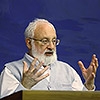Audio Version Of The Blog – 5/26/20
Listen to an Audio Version of the Blog
Download:MP3 Audio

Listen to an Audio Version of the Blog
Download:MP3 Audio
 Faith above reason requires a special mind. The fact is that the people of this world, you and I, each one of us, are built from egoism, the desire to receive, within which we feel all of reality.
Faith above reason requires a special mind. The fact is that the people of this world, you and I, each one of us, are built from egoism, the desire to receive, within which we feel all of reality.
We feel only that which can bring us pleasure or vice versa, cause us suffering, that is, plus or minus relative to our egoistic desire to live pleasant lives.
But here, a special approach is required of us. I do not want to feel what is pleasant or unpleasant to me, so I try to break free from this dependence, rise above it, and assess reality in terms of what is good or bad for others. In this way, I will begin to see what is outside of me. Otherwise, I do not see anything; the whole world for me is only what determines my own egoistic benefit.
I limit myself with this; I do not go beyond being an animal that thinks only of its own stomach or a small, naive child who understands only his own pleasure and does not take others into account.
Then, the child grows and seems to begin to take care of others, to see and understand the world more clearly. But, in fact, we do not see the world, we simply expand the field of our interests more and more, and can evaluate what will be in our favor and what will harm us.
The sensor with which we perceive reality is created from a single desire to receive; we must realize this. We live within our egoistic desire and this is called the creation of this world. In fact, there is no “this world, the future world, or the upper worlds.” There is only one reality that depends solely on our perception, on our attitude toward what is happening.
There are some phenomena in the world that we do not feel at all because our perception is determined only by what is good or bad for us. We just do not notice anything else.
If the signal is not picked up by my egoistic sensor, the desire to receive, either as positive or negative, then I do not feel it at all. Maybe something grand is happening around me, but I do not see anything.
Kabbalists who have attained the upper world say that it is right here. We do not need to go somewhere else, to the other end of the universe, to another galaxy, all the worlds are already here, next to us.
Only we do not feel them because we perceive reality only through one narrow parameter: I feel good or I feel bad. It turns out that all of reality is limited only by my primitive, egoistic interest.
But how can I see more, feel more, understand more, and start to come out of my cocoon? This is possible if I rise above the feeling of “I feel good or I feel bad” and acquire the quality of bestowal, the quality that is called faith. Then I will feel everything not in relation to my own benefit, but in relation to others.
If I begin to evaluate reality in this way, I will rise above myself and find a new sensory organ: faith above reason. This is how I enter a new, external perception of reality independent of my egoism. I will be able to feel what others feel outside of me and, thus, my view will become relatively objective depending on how much I can separate myself from my own interests.
I begin to see the objective reality that I was able to reveal: 125 spiritual degrees, five upper worlds, and I can then gradually develop this view until I am able to see everything that is outside of me. And what is outside of me is called the Creator or Boreh, meaning “Come and See.” Now, in my desire to receive, I see nothing, but I have the opportunity to attain the Creator, the reality that is outside of me.
Then, I will understand where I really live, what nature is, and what is happening to me. Therefore, this technique is called Kabbalah (receiving) because it teaches how to get a sense of all this boundless reality. A person who has developed such feelings is called a Kabbalist because he perceives reality objectively, not distorted in his egoistic perception but as it really is.
Even the very first exit from your egoism allows you to feel that the higher, spiritual reality exists! So, I begin to understand where I am, what I exist for, and why, as well as what process I must go through and what state I must achieve. Before that, we are completely blind, insensitive, and we have no way to look beyond our egoism. Only faith above reason can help us break free from it.
[263978]
From the 1st part of the Daily Kabbalah Lesson 4/30/20, “Concerning Faith Above Reason”
Related Material:
Viruses Instead Of The Creator
A Cross Section In An Unknown Dimension
That Elusive “Faith Above Reason”
 Michael Laitman, On Quora: “What has the Coronavirus taught you in your life?“
Michael Laitman, On Quora: “What has the Coronavirus taught you in your life?“
The coronavirus is teaching us all to recognize our global interdependence.
Before the coronavirus, we were in a world of vicious egoistic competition, where the more we could exploit others, the more we could profit.
Today, however, we all depend on each other, as any breach of the social distancing conditions set before us could mean another coronavirus victim.
We have been given a mutual adversary in the coronavirus, and we need to exercise our mutual consideration and responsibility in order to beat it.
However, our true rival is much deeper than the coronavirus.
As much as the coronavirus is a nearly-invisible particle that has brought about much death, sickness and has overturned our socio-economic infrastructures, there is a much more cunning and complex enemy that has no physical form at all—our egoistic human nature.
The human ego, which is the desire for self-benefit at the expense of others, innately pits us up against each other, making each person constantly toil for his or her superiority over others.
Any success we have in such a constant struggle is short-lived, as if we are all in a game of tug-and-war and one of us momentarily manages to pull stronger than the others, before losing that grip and once again becoming pulled along by everyone else. Ultimately, such a struggle leads to us all falling down, as the coronavirus swiftly showed us.
How, then, is it possible to defeat an attitude that is embedded in our very nature since birth?
It is possible firstly by paying more attention to how it acts to our detriment even though it seemingly serves to benefit us; and secondly, it is possible to overcome our egoistic nature by re-prioritizing our values.
Instead of appreciating successful, wealthy and powerful individuals as we did at least until the onset of the coronavirus, if we instead appreciate positive human connection, and acts that serve to increase love, care and unity in society, then such a surrounding positive social influence would give us the necessary tools to shift our mindset: from egoistic use of others for self-benefit, to altruistic use of oneself in order to benefit others.
The coronavirus has taught us that humanity can quickly reach a common ground when conditions call for it.
Using this example, we can take further steps to more and more unification out of our own free choice. In other words, instead of waiting for nature to inflict us with more suffering in order to unite us once again, we can take our unity into our own hands, and actively seek how we can place the benefit of others over self-benefit in our day-to-day and moment-to-moment interactions.
Photo by Nick Bolton on Unsplash.
 Michael Laitman, On Quora: “If everything is here for a reason, what does Coronavirus teach us about?“
Michael Laitman, On Quora: “If everything is here for a reason, what does Coronavirus teach us about?“
The coronavirus came to teach us about how much we depend on each other, and thus, how we need to take more responsibility in our attitudes to each other.
If we look at major events in world history, including the world wars and past pandemics, even they did not involve the entirety of humanity to the extent that the coronavirus has.
We would thus be wise to learn a lesson in global interdependence from the coronavirus, and step up our game to think and act more responsibly and considerately of each other, treating each other as members of a single human family, with each person holding equal importance.
While we normally consider only our own health, the coronavirus forced us to pay attention to the health of others around us by directly connecting our health to theirs.
We were cornered into upholding a list of conditions in order to not infect others—maintaining personal hygiene, washing hands regularly, staying at home during the lockdown, wearing masks and sustaining a distance of two meters when in public—and as the economy reopens, the period of distancing continues making us think about the health of others, since other people’s good health ensures our good health, and vice versa.
This is one clear way how the coronavirus has taught us a lesson in interdependence.
The question then becomes: How much do we apply this lesson to our lives?
From herein, will we conduct ourselves in such a way where society’s benefit leads our thought processes, or will we resort to prioritizing self-benefit without considering the effect on others, as per our pre-coronavirus habits?
Considering others before we consider ourselves runs against our egoistic human nature, which constantly places ourselves before others.
Yet, as hard as it is for us to think about benefiting others, the coronavirus has shown us how nature can compel us to do so whether we like it or not.
Nature, however, has no intention of making us suffer.
On the contrary, there is immense fulfillment and enjoyment dwelling in nature, which it wants us to discover.
It wants us to develop into all-seeing, all-knowing and all-feeling creatures, and it can do so by elevating us above our self-aimed thoughts and desires.
How? It is by giving us situations where we are forced to better connect in order to survive.
Such pressures are akin to birth contractions. As a baby gets pressured to exit its comfortable-but-narrow world in the womb and enter a new world outside, we too get pressured by events such as the coronavirus to exit our comfortable-but-narrow egoistic perceptions of the world, and enter a new perception of our interdependence.
Moreover, as the baby did not know that its life in the womb was tiny, dark and constrained, we too fail to see how living solely according to the ego’s demands—self-benefit at the expense of others—is a tiny, dark and constrained world in comparison to the world we can discover when we shift our main focus onto benefiting others.
As much as we appreciate and want to have love, peace, truth, happiness, confidence, support, encouragement and care in our lives, we fail to see how such qualities are achievable at a much greater scale when mutual responsibility and consideration becomes a leading value throughout society.
When everyone aims at benefiting everyone, and when we encourage contributing to society as a principle marker of success, instead of increasing our wealth at any cost, then we will experience a harmonious life, balanced with nature, and will feel a new sense of calm spread throughout society, fulfilling us all.
I thus hope that we do take away the lesson of needing to be more responsible and considerate of others, which the coronavirus came to teach us.
We all have a special role in contributing to a society that can make our lives great, and until we take some strides in that direction of our own accord, nature will send us reminders through the likes of many such problems, pandemics among them.
Above photo by engin akyurt on Unsplash.
My new article on Linkedin “The Truth about Climate Change”
Scientists keep warning about the changing climate, that there is global warming, so we must do A and B and C in order to reverse it. Global warming in itself is neither bad nor good. Nature has no standard that it needs to follow. It is in constant balance. At times, that balance is achieved at a warmer temperature, and at times it is achieved at a cooler temperature, but thinking that we can manipulate it to suit our whims is nothing but hubris.
Like nature, we should not try to change people, but only how they interact with one another.
If we want to feel good in the surrounding nature, we must adapt ourselves to it, and not the other way around. Nature is integral and balanced. All things evolve according to their nature and establish a balanced system of relationships among them that enables them to thrive.
We should not interfere with nature. If we try to tilt it according to our quirks, it will tilt us back against our will through its countless manners of pushback against humanity. The only place where we can and should work is with each other.
Like nature, we should not try to change people, but only how they interact with one another.
Currently, we use our strengths to control and manipulate others, and try to hide our weaknesses so others don’t exploit us. If, instead, we spent our energy on forming supportive and collaborative connections among us, we would benefit from everyone’s strengths instead of fearing them, and they would benefit from ours, instead of fearing and alienating us.
When we change our attitude to one another, we will find that nature, too, has changed its attitude toward us, since we will be in the same balance among each other as are all the elements of nature. Then, no climate change, earthquake, plague, or flood will threaten us, since nature and humanity will be in sync.
 Michael Laitman, On Quora: “What are some cool examples of two kinds of people?“
Michael Laitman, On Quora: “What are some cool examples of two kinds of people?“
There are fundamentally two kinds of people in our world: egoists and altruists.
Egoists do everything out of a calculation for personal benefit, and need to see justifiable compensation, like more money or an improved social status, for any act they do to benefit others.
Altruists willingly concede of themselves and of personal compensation in order to benefit others.
Egoism is human nature. It exists in every single person. Altruism, on the other hand, runs against human nature.
However, there are a minority in the world—altruists—who are an exception to society’s majority of egoists. Altruists constitute up to ten percent of human society.
Ultimately, however, we are developing to a state where we are realizing that an altruistic modus operandi in society as a whole will be able to alleviate the increasing problems we see in our egoistic-consumerist society.
The problem with making altruism a social norm is that the majority of egoists would feel a lack of compensation to be altruistic. It would be like a turning on a machine without any fuel.
Our current fuel to work in our egoistic-consumerist society is reward and punishment. In an ideal egoistic-consumerist setup, working more means reaping more rewards, which means more wealth, respect, power and knowledge, and working less means receiving the “punishment” of being unable to fulfill those desires.
However, the more we develop in an egoistic-consumerist society, the harder we find it becomes to fulfill ourselves. Various crises will eventually bring us to a sensation of helplessness, that we can no longer find fulfillment by prioritizing self-benefit over benefiting others.
We will then become readier to change our way of life and become more altruistic.
However, we will still require fuel for our altruistic society to function.
And what is altruistic fuel?
It is when giving, improving others’ lives and positive contributions to others become society’s leading values.
Developing an altruistic society starts by rewarding and appreciating acts of positive social contribution, and gradually, after a period of doing so, we would start appreciating altruistic values in and of themselves.
 Atzmuto is the highest root, which is not directly related to us, i.e., it is the Creator Himself existing independently from the creation. In this form, we cannot feel Him.
Atzmuto is the highest root, which is not directly related to us, i.e., it is the Creator Himself existing independently from the creation. In this form, we cannot feel Him.
In other words, Atzmuto is a program that does not relate to creation. We simply indicate that such a state exists, but it is out of reach for us. We cannot feel Him.
The program that relates to us is called the Creator or HaVaYaH.
Question: Might it be that the Creator has some other plans for some other creations, but we do not know?
Answer: This does not apply to us.
Question: Can this be compared with the fact that in our world, a child understands a certain kind of father’s attitude toward him, but he does not know what his father is doing, what his plans are, etc.?
Answer: Yes, you could say that. But we do not engage in such thoughts and speculations because they still have no basis. We have no real desire for this nor any opportunities to explore this.
[264441]
From KabTV’s “Fundamentals of Kabbalah,” 6/17/19
Related Material:
What Is Atzmuto?
The Creator And Atzmuto
The Means To Attain The Creator
 I need a society that I will envy because thanks to this envy I can rise to its level. If I know how to use envy correctly, then I will attract the upper light with its help and it will raise me to the stage of the friends. This is a real miracle!
I need a society that I will envy because thanks to this envy I can rise to its level. If I know how to use envy correctly, then I will attract the upper light with its help and it will raise me to the stage of the friends. This is a real miracle!
Otherwise how could our children, who were born helpless babies, grow up and master all our knowledge and still surpass us, become smarter than us and better understand the affairs of this world. It is due to the fact that they envied us, looked at us and tried to imitate everything we do, and therefore, they became smart and understand even more than we do.
Therefore, if we look at our friends and see that they are greater than us, then we will certainly grow up. So, I need a society as large as possible that consists of people that are great in my eyes so I consider myself the smallest of all. Then I’m guaranteed advancement. And I will advance not only in terms of the mind, but will also develop sensations that I do not have yet. And all due to envy.
If I see the greatness of a friend and in my egoism I want him to fall, this envy is destructive. But if I want to become like him and even bigger, then because of such envy I want to grow toward the Creator.
I must develop jealousy of every friend, and I can do it even with a complete beginner. After all, everyone has their own root of their soul; I look at him and see that he is special, that he is closer to the Creator.
I do not compare our personal distances with the Creator. But from his point, he will certainly be closer to the Creator than I am because I don’t have his point at all. Therefore, I have reason to envy absolutely everyone.
There is a light in the friend that can never be in me and this is the basis for envy. When can I turn this envy into unity and love?
Only at the end of correction where all will unite into one soul. But until then, I will look at a friend and see what is in him that is not in me and cannot be. Only at the end of correction when we connect will I receive this from merging with him.
There is always the opportunity to envy; I just need to take a closer look and I will see that others are closer to the Creator than I am. They are more connected with each other, but I seem to fall out of their circle, and this torments me. It seems to me that they want to get rid of a loser like me who cannot connect with anyone. They reveal to me how much my heart does not want unity.
Envy is a tremendous force, even stronger than love. Envy is a means of rising from step to step every time. Therefore, it is said that “the envy of those counting multiplies wisdom,” that is, those who calculate at what level they are, moving up the steps of wisdom (Hochma). The upper light is the light of Hochma (wisdom), and overcoming envy, they develop the light of Hassadim in themselves.
[264996]
From the 1st part of the Daily Kabbalah Lesson 5/20/20, Writings of Rabash, “Concerning Above Reason”
Related Material:
Envying The Friends
Envy That Helps Us Advance
Envy Is Not A Flaw
 The Combination of Masculine and Feminine Principles
The Combination of Masculine and Feminine Principles
Rabash, Dargot HaSulam, Item 274, “Specifically through a Man and a Woman”: A newborn is born specifically through a man and a woman. From a male alone or from a female alone, there cannot be offspring. In ethics, the male is considered “the power of bestowal,” and the female is “the power of reception.” Offspring are good deeds, in which there is the breath of life.
The masculine principle is an intention for the sake of bestowal and the feminine principle is the desire to receive. If they are interconnected, then their correct combination occurs. And it turns out that when the desire to receive and above it the intention to bestow interact, they can reveal the Creator within themselves, i.e., produce the best, highest action that is subject to creation in our world.
No man and no woman can do this separately. Only in the right combination of the male giving and the female receiving properties can they realize receiving for the sake of bestowal, that is, make themselves like the Creator. Otherwise, none of them is perfect.
Question: What is the rule of the correct combination of female and male principles?
Answer: If we are talking about Kabbalah, then according to this teaching, male and female principles are in each of us. A person must work so that his or her desire to receive is completely under the intention of giving (for the sake of bestowal). And then you get the right interaction.
We must understand that we are not talking about a woman and a man but about the correct interaction of these principles in a person.
And on the other hand, if we are talking about the family, about the right relationship between a man and a woman, then we are talking about their clear understanding of their properties when the properties of a woman and the properties of a man are combined in such a way that they really give spiritual fruit. Each time they give birth to the next state, and this is called the birth of their child.
[263058]
From KabTV’s “Fundamentals of Kabbalah,” 3/8/20
Related Material:
The Spiritual Role Of Women, Part 1
Female Desire And Male Intention
“Time Of Women’s Leadership” (Medium)
 Question: What will the new society be like in this era of change? What should we do?
Question: What will the new society be like in this era of change? What should we do?
Answer: Study Kabbalah and explore what the initial stages of the new society are. Accept them, adapt to them, reveal them in our world, and explain them to others.
Question: Did you expect that this would happen so quickly and that we would be placed face to face with nature?
Answer: Not so suddenly.
Remark: Nature suddenly wants us to make a choice now.
My Response: It is just that nature is revealed in such a manner. There is no malicious intent.
Question: Does Kabbalah know how to find a cure for the coronavirus?
Answer: The only problem of nature is disconnection, division, opposition. Therefore, the only cure for this is the unification of all its parts. This is the cure for the coronavirus.
Thus, no matter where you turn, you will find an answer to the question and its verification. Whatever you are being offered, check if your decision leads people to summarize everything, connect, then it is a cure. If not, then it is evil and damage.
[265042]
From KabTV’s “Fundamentals of Kabbalah,” 4/12/20
Related Material:
On The Threshold Of Renewal Of Humanity
Universal Vaccination Against All Viruses
Coronavirus Vaccine